Impact of Online Review Sites (TripAdvisor, Expedia) on Accommodation
VerifiedAdded on 2022/10/04
|8
|2032
|187
Essay
AI Summary
This essay delves into the significant influence of online review platforms such as TripAdvisor and Expedia on prospective clients within the accommodation sector. It begins by highlighting the crucial role of Information Technology (IT) in the hospitality industry, setting the stage for the discussion on user-generated content (UGC). The essay defines UGC and examines its impact on official rating agencies, exploring the connection between UGC and self-accreditation practices adopted by hotels. It further analyzes how hotels can be both positively and negatively affected by UGC, particularly through social media. The concept of 'Moments of Truth' is discussed in relation to the topic, emphasizing the importance of customer interactions. The essay then suggests actionable strategies for hotels to manage and leverage UGC, aiming to enhance guest satisfaction and overall experiences. It concludes by underscoring the value of UGC in shaping customer perceptions and influencing revenue within the accommodation sector, emphasizing the need for hotels to actively engage with online reviews to maintain competitiveness.

Accommodation Operation
Paraphrase This Document
Need a fresh take? Get an instant paraphrase of this document with our AI Paraphraser
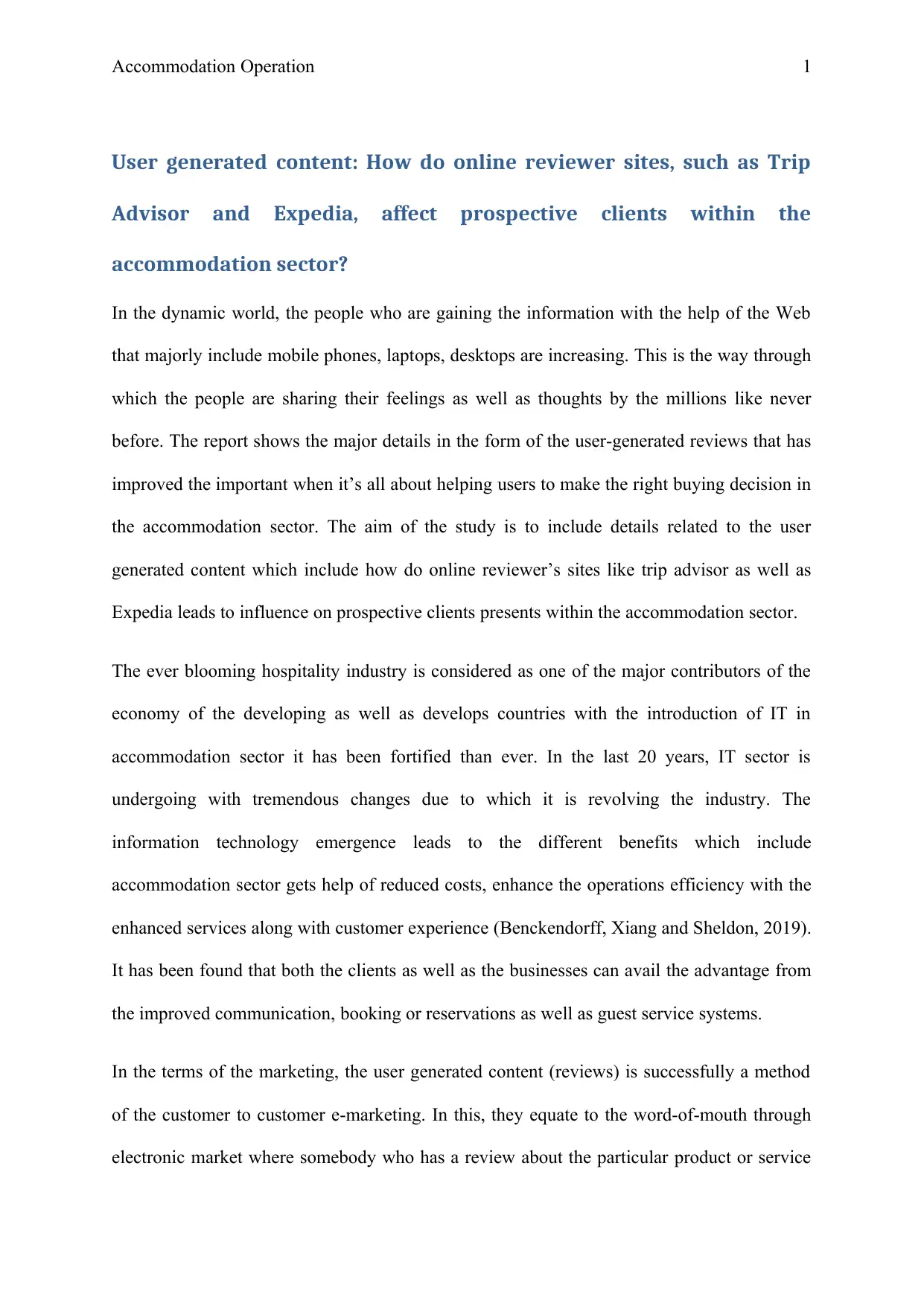
Accommodation Operation 1
User generated content: How do online reviewer sites, such as Trip
Advisor and Expedia, affect prospective clients within the
accommodation sector?
In the dynamic world, the people who are gaining the information with the help of the Web
that majorly include mobile phones, laptops, desktops are increasing. This is the way through
which the people are sharing their feelings as well as thoughts by the millions like never
before. The report shows the major details in the form of the user-generated reviews that has
improved the important when it’s all about helping users to make the right buying decision in
the accommodation sector. The aim of the study is to include details related to the user
generated content which include how do online reviewer’s sites like trip advisor as well as
Expedia leads to influence on prospective clients presents within the accommodation sector.
The ever blooming hospitality industry is considered as one of the major contributors of the
economy of the developing as well as develops countries with the introduction of IT in
accommodation sector it has been fortified than ever. In the last 20 years, IT sector is
undergoing with tremendous changes due to which it is revolving the industry. The
information technology emergence leads to the different benefits which include
accommodation sector gets help of reduced costs, enhance the operations efficiency with the
enhanced services along with customer experience (Benckendorff, Xiang and Sheldon, 2019).
It has been found that both the clients as well as the businesses can avail the advantage from
the improved communication, booking or reservations as well as guest service systems.
In the terms of the marketing, the user generated content (reviews) is successfully a method
of the customer to customer e-marketing. In this, they equate to the word-of-mouth through
electronic market where somebody who has a review about the particular product or service
User generated content: How do online reviewer sites, such as Trip
Advisor and Expedia, affect prospective clients within the
accommodation sector?
In the dynamic world, the people who are gaining the information with the help of the Web
that majorly include mobile phones, laptops, desktops are increasing. This is the way through
which the people are sharing their feelings as well as thoughts by the millions like never
before. The report shows the major details in the form of the user-generated reviews that has
improved the important when it’s all about helping users to make the right buying decision in
the accommodation sector. The aim of the study is to include details related to the user
generated content which include how do online reviewer’s sites like trip advisor as well as
Expedia leads to influence on prospective clients presents within the accommodation sector.
The ever blooming hospitality industry is considered as one of the major contributors of the
economy of the developing as well as develops countries with the introduction of IT in
accommodation sector it has been fortified than ever. In the last 20 years, IT sector is
undergoing with tremendous changes due to which it is revolving the industry. The
information technology emergence leads to the different benefits which include
accommodation sector gets help of reduced costs, enhance the operations efficiency with the
enhanced services along with customer experience (Benckendorff, Xiang and Sheldon, 2019).
It has been found that both the clients as well as the businesses can avail the advantage from
the improved communication, booking or reservations as well as guest service systems.
In the terms of the marketing, the user generated content (reviews) is successfully a method
of the customer to customer e-marketing. In this, they equate to the word-of-mouth through
electronic market where somebody who has a review about the particular product or service
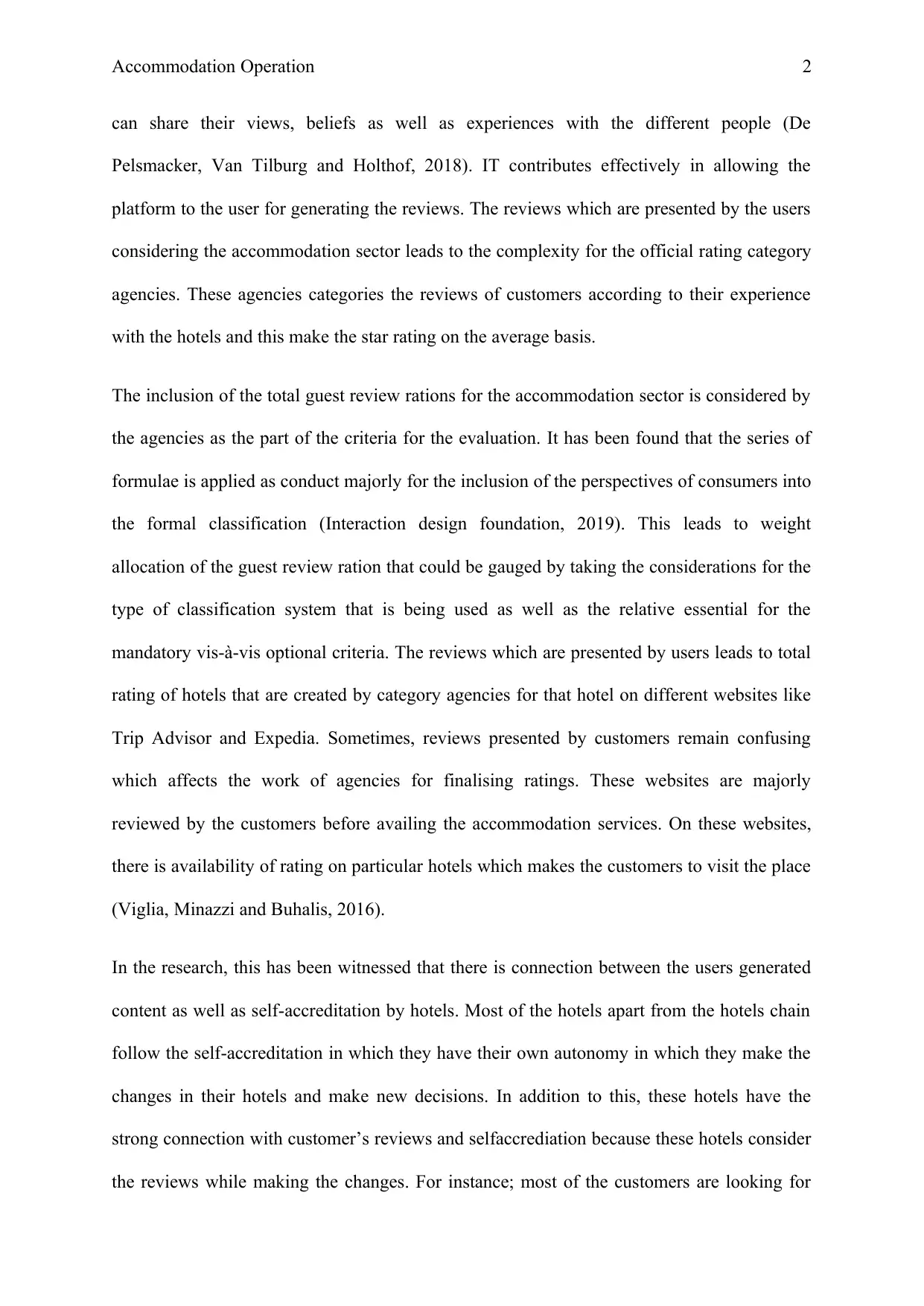
Accommodation Operation 2
can share their views, beliefs as well as experiences with the different people (De
Pelsmacker, Van Tilburg and Holthof, 2018). IT contributes effectively in allowing the
platform to the user for generating the reviews. The reviews which are presented by the users
considering the accommodation sector leads to the complexity for the official rating category
agencies. These agencies categories the reviews of customers according to their experience
with the hotels and this make the star rating on the average basis.
The inclusion of the total guest review rations for the accommodation sector is considered by
the agencies as the part of the criteria for the evaluation. It has been found that the series of
formulae is applied as conduct majorly for the inclusion of the perspectives of consumers into
the formal classification (Interaction design foundation, 2019). This leads to weight
allocation of the guest review ration that could be gauged by taking the considerations for the
type of classification system that is being used as well as the relative essential for the
mandatory vis-à-vis optional criteria. The reviews which are presented by users leads to total
rating of hotels that are created by category agencies for that hotel on different websites like
Trip Advisor and Expedia. Sometimes, reviews presented by customers remain confusing
which affects the work of agencies for finalising ratings. These websites are majorly
reviewed by the customers before availing the accommodation services. On these websites,
there is availability of rating on particular hotels which makes the customers to visit the place
(Viglia, Minazzi and Buhalis, 2016).
In the research, this has been witnessed that there is connection between the users generated
content as well as self-accreditation by hotels. Most of the hotels apart from the hotels chain
follow the self-accreditation in which they have their own autonomy in which they make the
changes in their hotels and make new decisions. In addition to this, these hotels have the
strong connection with customer’s reviews and selfaccrediation because these hotels consider
the reviews while making the changes. For instance; most of the customers are looking for
can share their views, beliefs as well as experiences with the different people (De
Pelsmacker, Van Tilburg and Holthof, 2018). IT contributes effectively in allowing the
platform to the user for generating the reviews. The reviews which are presented by the users
considering the accommodation sector leads to the complexity for the official rating category
agencies. These agencies categories the reviews of customers according to their experience
with the hotels and this make the star rating on the average basis.
The inclusion of the total guest review rations for the accommodation sector is considered by
the agencies as the part of the criteria for the evaluation. It has been found that the series of
formulae is applied as conduct majorly for the inclusion of the perspectives of consumers into
the formal classification (Interaction design foundation, 2019). This leads to weight
allocation of the guest review ration that could be gauged by taking the considerations for the
type of classification system that is being used as well as the relative essential for the
mandatory vis-à-vis optional criteria. The reviews which are presented by users leads to total
rating of hotels that are created by category agencies for that hotel on different websites like
Trip Advisor and Expedia. Sometimes, reviews presented by customers remain confusing
which affects the work of agencies for finalising ratings. These websites are majorly
reviewed by the customers before availing the accommodation services. On these websites,
there is availability of rating on particular hotels which makes the customers to visit the place
(Viglia, Minazzi and Buhalis, 2016).
In the research, this has been witnessed that there is connection between the users generated
content as well as self-accreditation by hotels. Most of the hotels apart from the hotels chain
follow the self-accreditation in which they have their own autonomy in which they make the
changes in their hotels and make new decisions. In addition to this, these hotels have the
strong connection with customer’s reviews and selfaccrediation because these hotels consider
the reviews while making the changes. For instance; most of the customers are looking for
⊘ This is a preview!⊘
Do you want full access?
Subscribe today to unlock all pages.

Trusted by 1+ million students worldwide
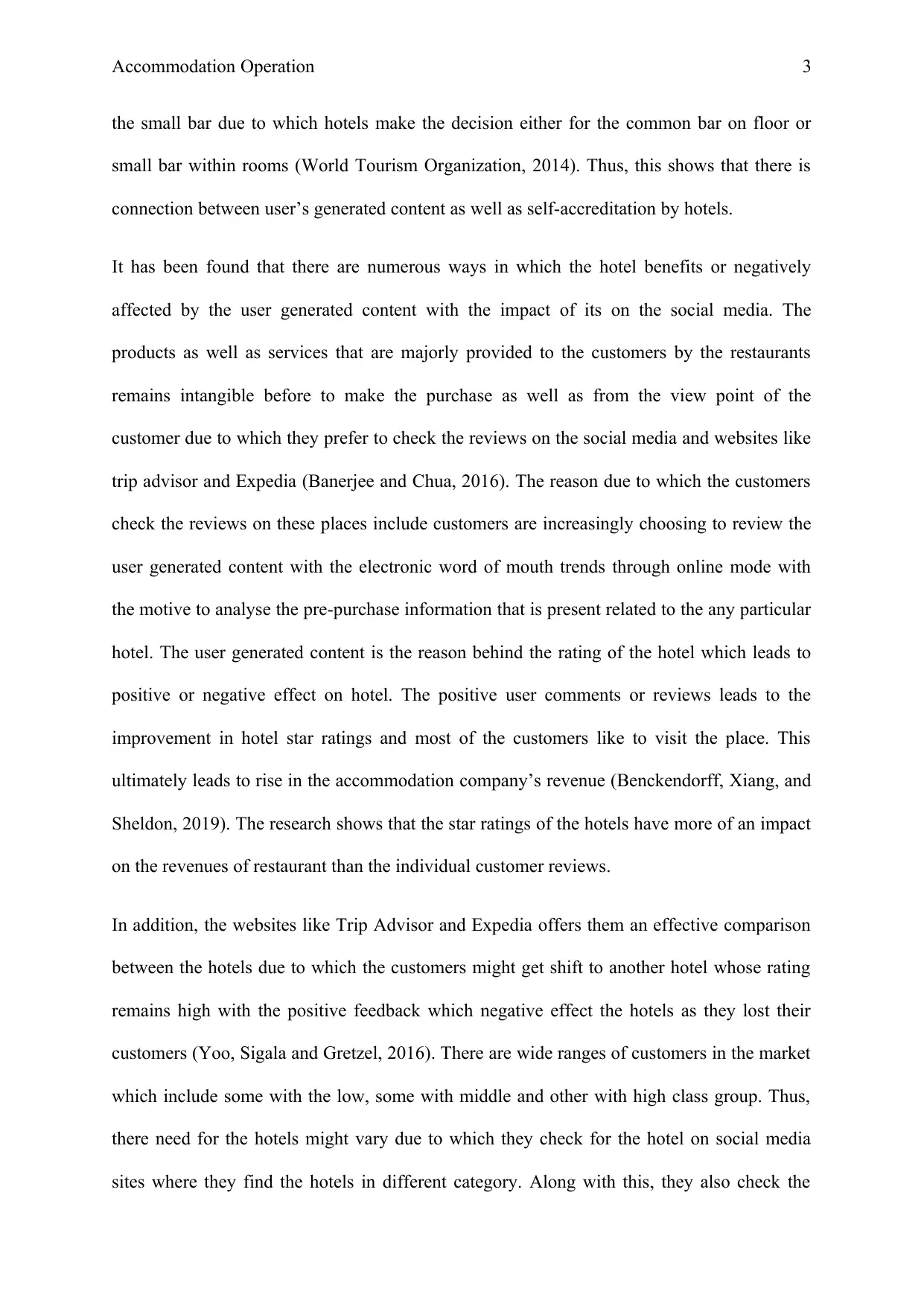
Accommodation Operation 3
the small bar due to which hotels make the decision either for the common bar on floor or
small bar within rooms (World Tourism Organization, 2014). Thus, this shows that there is
connection between user’s generated content as well as self-accreditation by hotels.
It has been found that there are numerous ways in which the hotel benefits or negatively
affected by the user generated content with the impact of its on the social media. The
products as well as services that are majorly provided to the customers by the restaurants
remains intangible before to make the purchase as well as from the view point of the
customer due to which they prefer to check the reviews on the social media and websites like
trip advisor and Expedia (Banerjee and Chua, 2016). The reason due to which the customers
check the reviews on these places include customers are increasingly choosing to review the
user generated content with the electronic word of mouth trends through online mode with
the motive to analyse the pre-purchase information that is present related to the any particular
hotel. The user generated content is the reason behind the rating of the hotel which leads to
positive or negative effect on hotel. The positive user comments or reviews leads to the
improvement in hotel star ratings and most of the customers like to visit the place. This
ultimately leads to rise in the accommodation company’s revenue (Benckendorff, Xiang, and
Sheldon, 2019). The research shows that the star ratings of the hotels have more of an impact
on the revenues of restaurant than the individual customer reviews.
In addition, the websites like Trip Advisor and Expedia offers them an effective comparison
between the hotels due to which the customers might get shift to another hotel whose rating
remains high with the positive feedback which negative effect the hotels as they lost their
customers (Yoo, Sigala and Gretzel, 2016). There are wide ranges of customers in the market
which include some with the low, some with middle and other with high class group. Thus,
there need for the hotels might vary due to which they check for the hotel on social media
sites where they find the hotels in different category. Along with this, they also check the
the small bar due to which hotels make the decision either for the common bar on floor or
small bar within rooms (World Tourism Organization, 2014). Thus, this shows that there is
connection between user’s generated content as well as self-accreditation by hotels.
It has been found that there are numerous ways in which the hotel benefits or negatively
affected by the user generated content with the impact of its on the social media. The
products as well as services that are majorly provided to the customers by the restaurants
remains intangible before to make the purchase as well as from the view point of the
customer due to which they prefer to check the reviews on the social media and websites like
trip advisor and Expedia (Banerjee and Chua, 2016). The reason due to which the customers
check the reviews on these places include customers are increasingly choosing to review the
user generated content with the electronic word of mouth trends through online mode with
the motive to analyse the pre-purchase information that is present related to the any particular
hotel. The user generated content is the reason behind the rating of the hotel which leads to
positive or negative effect on hotel. The positive user comments or reviews leads to the
improvement in hotel star ratings and most of the customers like to visit the place. This
ultimately leads to rise in the accommodation company’s revenue (Benckendorff, Xiang, and
Sheldon, 2019). The research shows that the star ratings of the hotels have more of an impact
on the revenues of restaurant than the individual customer reviews.
In addition, the websites like Trip Advisor and Expedia offers them an effective comparison
between the hotels due to which the customers might get shift to another hotel whose rating
remains high with the positive feedback which negative effect the hotels as they lost their
customers (Yoo, Sigala and Gretzel, 2016). There are wide ranges of customers in the market
which include some with the low, some with middle and other with high class group. Thus,
there need for the hotels might vary due to which they check for the hotel on social media
sites where they find the hotels in different category. Along with this, they also check the
Paraphrase This Document
Need a fresh take? Get an instant paraphrase of this document with our AI Paraphraser
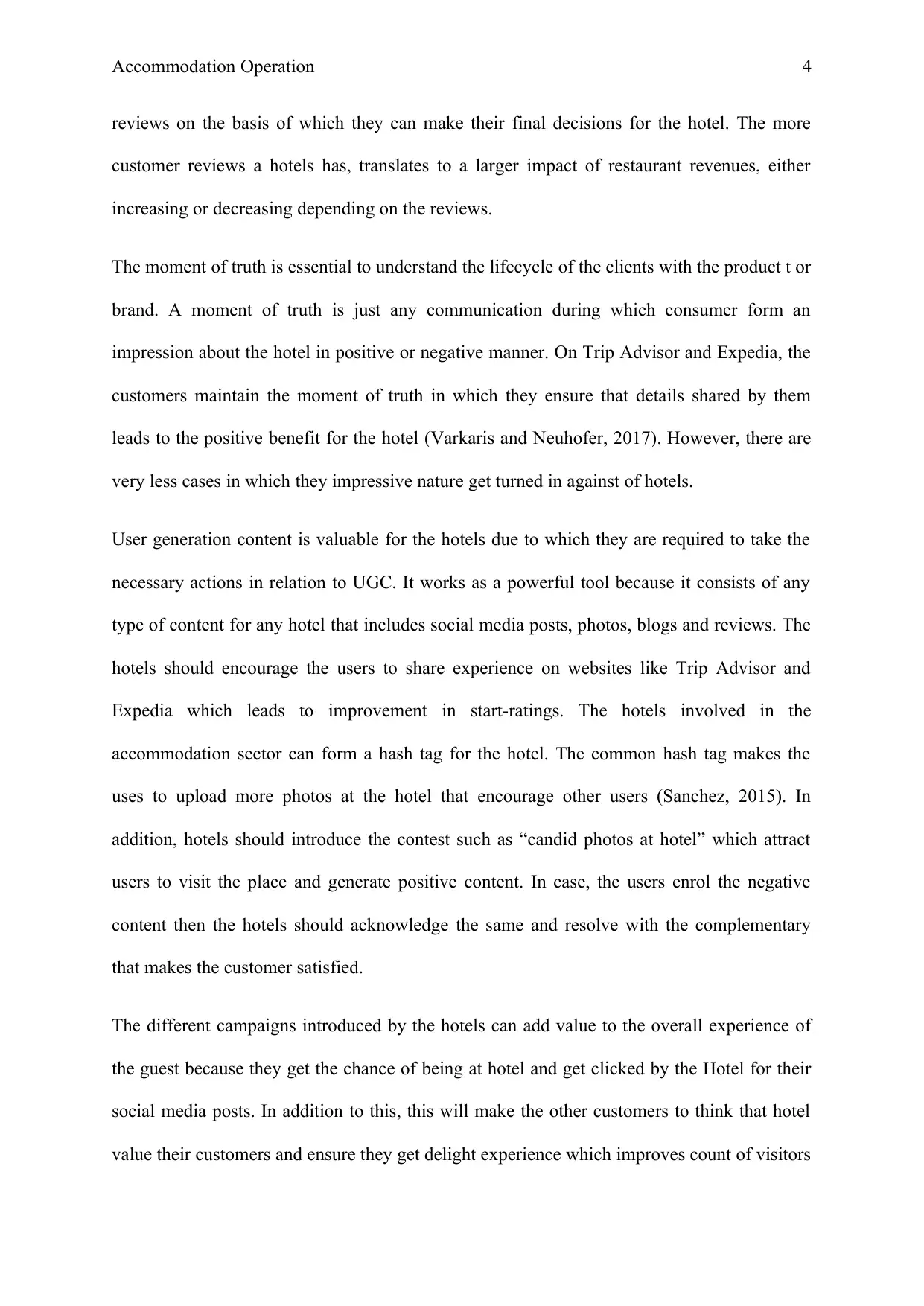
Accommodation Operation 4
reviews on the basis of which they can make their final decisions for the hotel. The more
customer reviews a hotels has, translates to a larger impact of restaurant revenues, either
increasing or decreasing depending on the reviews.
The moment of truth is essential to understand the lifecycle of the clients with the product t or
brand. A moment of truth is just any communication during which consumer form an
impression about the hotel in positive or negative manner. On Trip Advisor and Expedia, the
customers maintain the moment of truth in which they ensure that details shared by them
leads to the positive benefit for the hotel (Varkaris and Neuhofer, 2017). However, there are
very less cases in which they impressive nature get turned in against of hotels.
User generation content is valuable for the hotels due to which they are required to take the
necessary actions in relation to UGC. It works as a powerful tool because it consists of any
type of content for any hotel that includes social media posts, photos, blogs and reviews. The
hotels should encourage the users to share experience on websites like Trip Advisor and
Expedia which leads to improvement in start-ratings. The hotels involved in the
accommodation sector can form a hash tag for the hotel. The common hash tag makes the
uses to upload more photos at the hotel that encourage other users (Sanchez, 2015). In
addition, hotels should introduce the contest such as “candid photos at hotel” which attract
users to visit the place and generate positive content. In case, the users enrol the negative
content then the hotels should acknowledge the same and resolve with the complementary
that makes the customer satisfied.
The different campaigns introduced by the hotels can add value to the overall experience of
the guest because they get the chance of being at hotel and get clicked by the Hotel for their
social media posts. In addition to this, this will make the other customers to think that hotel
value their customers and ensure they get delight experience which improves count of visitors
reviews on the basis of which they can make their final decisions for the hotel. The more
customer reviews a hotels has, translates to a larger impact of restaurant revenues, either
increasing or decreasing depending on the reviews.
The moment of truth is essential to understand the lifecycle of the clients with the product t or
brand. A moment of truth is just any communication during which consumer form an
impression about the hotel in positive or negative manner. On Trip Advisor and Expedia, the
customers maintain the moment of truth in which they ensure that details shared by them
leads to the positive benefit for the hotel (Varkaris and Neuhofer, 2017). However, there are
very less cases in which they impressive nature get turned in against of hotels.
User generation content is valuable for the hotels due to which they are required to take the
necessary actions in relation to UGC. It works as a powerful tool because it consists of any
type of content for any hotel that includes social media posts, photos, blogs and reviews. The
hotels should encourage the users to share experience on websites like Trip Advisor and
Expedia which leads to improvement in start-ratings. The hotels involved in the
accommodation sector can form a hash tag for the hotel. The common hash tag makes the
uses to upload more photos at the hotel that encourage other users (Sanchez, 2015). In
addition, hotels should introduce the contest such as “candid photos at hotel” which attract
users to visit the place and generate positive content. In case, the users enrol the negative
content then the hotels should acknowledge the same and resolve with the complementary
that makes the customer satisfied.
The different campaigns introduced by the hotels can add value to the overall experience of
the guest because they get the chance of being at hotel and get clicked by the Hotel for their
social media posts. In addition to this, this will make the other customers to think that hotel
value their customers and ensure they get delight experience which improves count of visitors
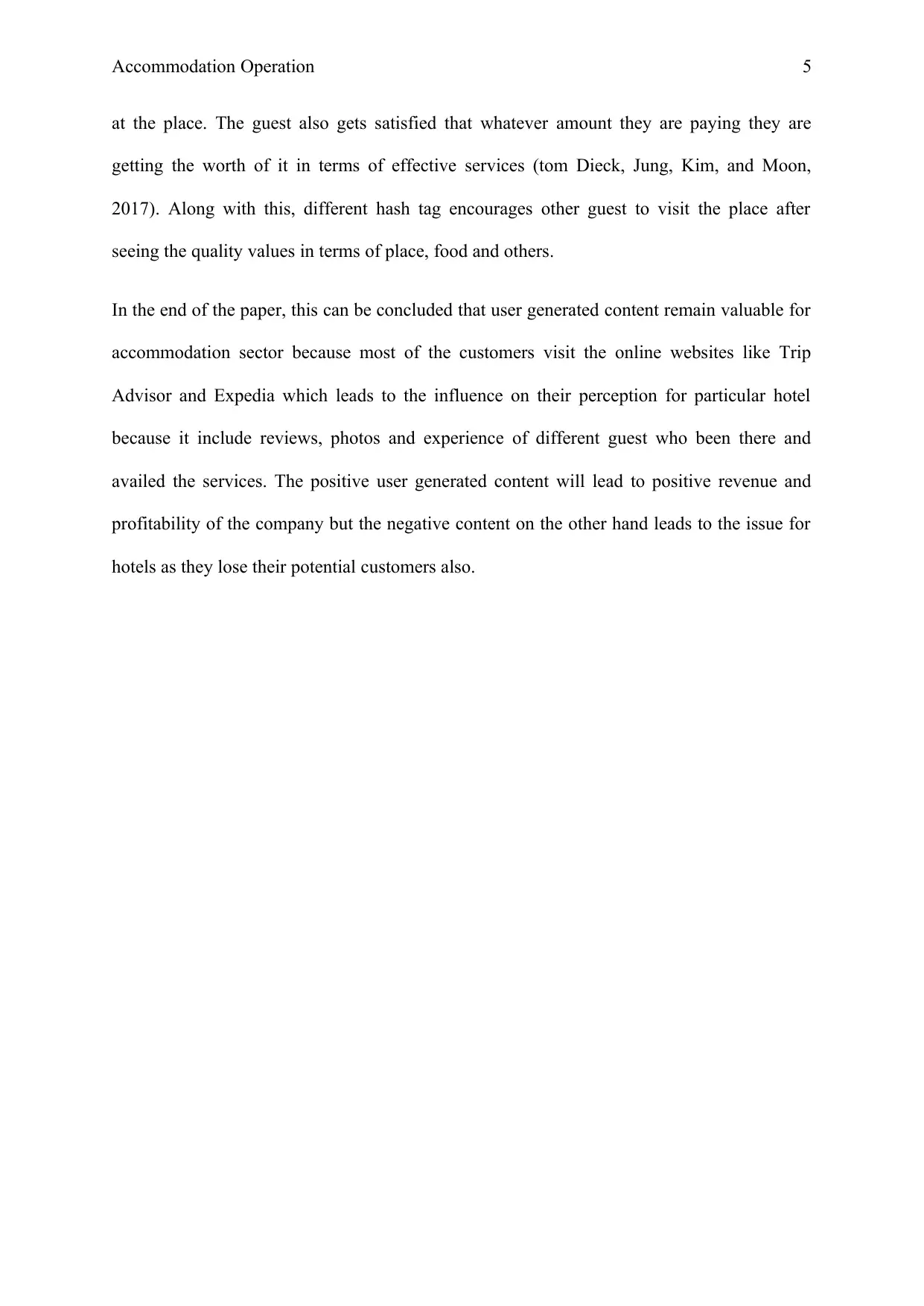
Accommodation Operation 5
at the place. The guest also gets satisfied that whatever amount they are paying they are
getting the worth of it in terms of effective services (tom Dieck, Jung, Kim, and Moon,
2017). Along with this, different hash tag encourages other guest to visit the place after
seeing the quality values in terms of place, food and others.
In the end of the paper, this can be concluded that user generated content remain valuable for
accommodation sector because most of the customers visit the online websites like Trip
Advisor and Expedia which leads to the influence on their perception for particular hotel
because it include reviews, photos and experience of different guest who been there and
availed the services. The positive user generated content will lead to positive revenue and
profitability of the company but the negative content on the other hand leads to the issue for
hotels as they lose their potential customers also.
at the place. The guest also gets satisfied that whatever amount they are paying they are
getting the worth of it in terms of effective services (tom Dieck, Jung, Kim, and Moon,
2017). Along with this, different hash tag encourages other guest to visit the place after
seeing the quality values in terms of place, food and others.
In the end of the paper, this can be concluded that user generated content remain valuable for
accommodation sector because most of the customers visit the online websites like Trip
Advisor and Expedia which leads to the influence on their perception for particular hotel
because it include reviews, photos and experience of different guest who been there and
availed the services. The positive user generated content will lead to positive revenue and
profitability of the company but the negative content on the other hand leads to the issue for
hotels as they lose their potential customers also.
⊘ This is a preview!⊘
Do you want full access?
Subscribe today to unlock all pages.

Trusted by 1+ million students worldwide
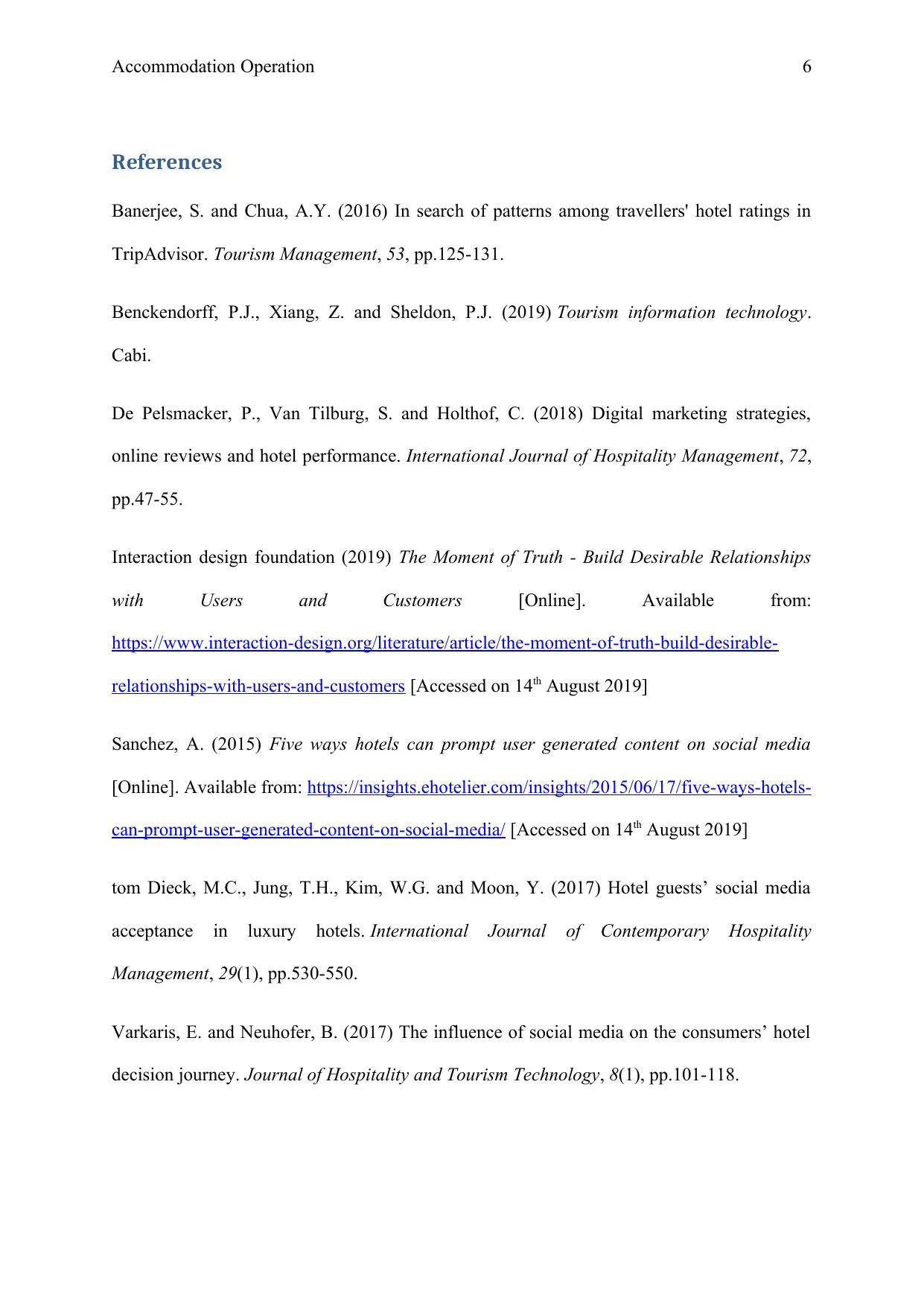
Accommodation Operation 6
References
Banerjee, S. and Chua, A.Y. (2016) In search of patterns among travellers' hotel ratings in
TripAdvisor. Tourism Management, 53, pp.125-131.
Benckendorff, P.J., Xiang, Z. and Sheldon, P.J. (2019) Tourism information technology.
Cabi.
De Pelsmacker, P., Van Tilburg, S. and Holthof, C. (2018) Digital marketing strategies,
online reviews and hotel performance. International Journal of Hospitality Management, 72,
pp.47-55.
Interaction design foundation (2019) The Moment of Truth - Build Desirable Relationships
with Users and Customers [Online]. Available from:
https://www.interaction-design.org/literature/article/the-moment-of-truth-build-desirable-
relationships-with-users-and-customers [Accessed on 14th August 2019]
Sanchez, A. (2015) Five ways hotels can prompt user generated content on social media
[Online]. Available from: https://insights.ehotelier.com/insights/2015/06/17/five-ways-hotels-
can-prompt-user-generated-content-on-social-media/ [Accessed on 14th August 2019]
tom Dieck, M.C., Jung, T.H., Kim, W.G. and Moon, Y. (2017) Hotel guests’ social media
acceptance in luxury hotels. International Journal of Contemporary Hospitality
Management, 29(1), pp.530-550.
Varkaris, E. and Neuhofer, B. (2017) The influence of social media on the consumers’ hotel
decision journey. Journal of Hospitality and Tourism Technology, 8(1), pp.101-118.
References
Banerjee, S. and Chua, A.Y. (2016) In search of patterns among travellers' hotel ratings in
TripAdvisor. Tourism Management, 53, pp.125-131.
Benckendorff, P.J., Xiang, Z. and Sheldon, P.J. (2019) Tourism information technology.
Cabi.
De Pelsmacker, P., Van Tilburg, S. and Holthof, C. (2018) Digital marketing strategies,
online reviews and hotel performance. International Journal of Hospitality Management, 72,
pp.47-55.
Interaction design foundation (2019) The Moment of Truth - Build Desirable Relationships
with Users and Customers [Online]. Available from:
https://www.interaction-design.org/literature/article/the-moment-of-truth-build-desirable-
relationships-with-users-and-customers [Accessed on 14th August 2019]
Sanchez, A. (2015) Five ways hotels can prompt user generated content on social media
[Online]. Available from: https://insights.ehotelier.com/insights/2015/06/17/five-ways-hotels-
can-prompt-user-generated-content-on-social-media/ [Accessed on 14th August 2019]
tom Dieck, M.C., Jung, T.H., Kim, W.G. and Moon, Y. (2017) Hotel guests’ social media
acceptance in luxury hotels. International Journal of Contemporary Hospitality
Management, 29(1), pp.530-550.
Varkaris, E. and Neuhofer, B. (2017) The influence of social media on the consumers’ hotel
decision journey. Journal of Hospitality and Tourism Technology, 8(1), pp.101-118.
Paraphrase This Document
Need a fresh take? Get an instant paraphrase of this document with our AI Paraphraser
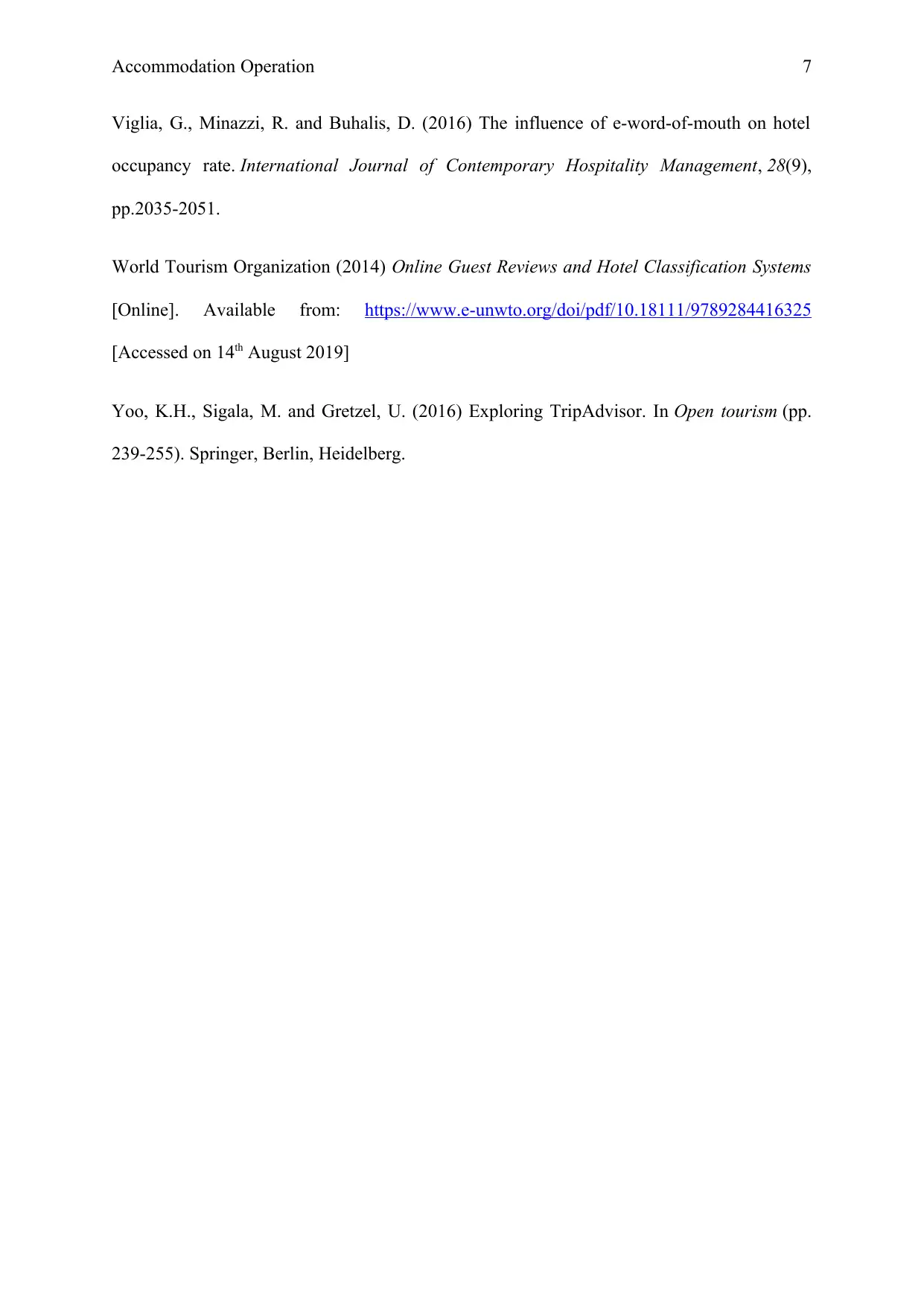
Accommodation Operation 7
Viglia, G., Minazzi, R. and Buhalis, D. (2016) The influence of e-word-of-mouth on hotel
occupancy rate. International Journal of Contemporary Hospitality Management, 28(9),
pp.2035-2051.
World Tourism Organization (2014) Online Guest Reviews and Hotel Classification Systems
[Online]. Available from: https://www.e-unwto.org/doi/pdf/10.18111/9789284416325
[Accessed on 14th August 2019]
Yoo, K.H., Sigala, M. and Gretzel, U. (2016) Exploring TripAdvisor. In Open tourism (pp.
239-255). Springer, Berlin, Heidelberg.
Viglia, G., Minazzi, R. and Buhalis, D. (2016) The influence of e-word-of-mouth on hotel
occupancy rate. International Journal of Contemporary Hospitality Management, 28(9),
pp.2035-2051.
World Tourism Organization (2014) Online Guest Reviews and Hotel Classification Systems
[Online]. Available from: https://www.e-unwto.org/doi/pdf/10.18111/9789284416325
[Accessed on 14th August 2019]
Yoo, K.H., Sigala, M. and Gretzel, U. (2016) Exploring TripAdvisor. In Open tourism (pp.
239-255). Springer, Berlin, Heidelberg.
1 out of 8
Your All-in-One AI-Powered Toolkit for Academic Success.
+13062052269
info@desklib.com
Available 24*7 on WhatsApp / Email
![[object Object]](/_next/static/media/star-bottom.7253800d.svg)
Unlock your academic potential
Copyright © 2020–2026 A2Z Services. All Rights Reserved. Developed and managed by ZUCOL.

